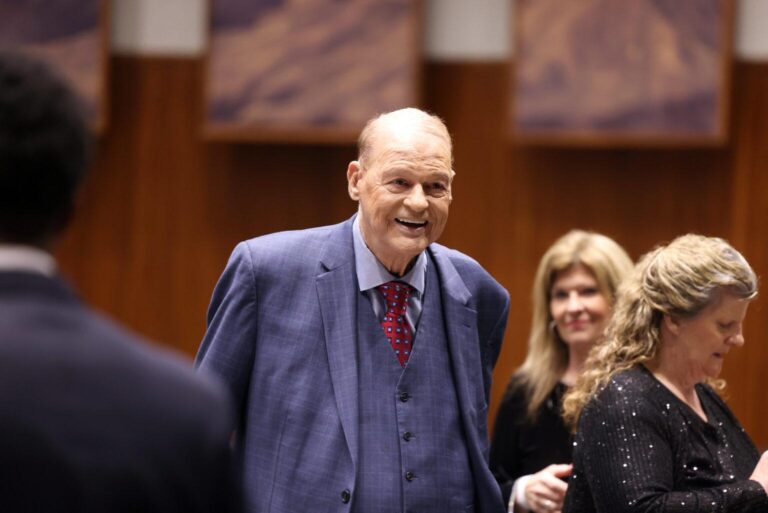ArizonaŌĆÖs superintendent of public instruction has expressed support for former President Donald TrumpŌĆÖs proposal to dismantle the U.S. Department of Education, marking a significant alignment between state and federal-level education policy critics. In a statement to AZFamily, the Arizona schools chief highlighted concerns over federal overreach and advocated for increased state control over educational standards and funding. This endorsement adds momentum to an ongoing national debate about the future role of the federal government in K-12 education.
Arizona Schools Chief Supports Trump Proposal to Shut Down Federal Education Agency
Arizona’s education leader has publicly endorsed former President Donald TrumpŌĆÖs proposal to dismantle the U.S. Department of Education, asserting that such a move would return control of schools to states and local communities. This stance highlights a growing sentiment among some state officials who argue that federal oversight has constrained innovation and responsiveness in education policies. The Arizona schools chief emphasized that shifting authority away from Washington could empower educators and parents to tailor learning environments more effectively to local needs.
Key points raised in support of this position include:
- Increased local autonomy: Advocates believe states should design curricula and assessment standards without federal mandates.
- Reduction of bureaucracy: Critics argue that the Department of Education creates unnecessary layers of regulation that slow progress.
- Enhanced accountability: With the federal agency gone, state and district leaders would be directly responsible for educational outcomes, improving transparency.
| Potential Impact | Supporters’ View | Opponents’ Concerns |
|---|---|---|
| Curriculum Decisions | More adaptable to local values | Risk of inconsistency across states |
| Funding Allocation | Greater state control and prioritization | Unequal resource distribution |
| Student Protections | Closer monitoring by local officials | Potential weakening of civil rights enforcement |
Implications for State Control and Local School Districts Explored
Arizona’s education leadership underscores a growing call for increased autonomy, emphasizing that state governments and local districts are better positioned to address the unique needs of their student populations. By reducing federal intervention, proponents believe that curricula can become more tailored and culturally relevant, while administrative decisions will reflect local priorities and values without the constraints of broad, one-size-fits-all mandates.
Key impacts anticipated include:
- Enhanced Flexibility: Local districts gain authority to implement innovative teaching methods and allocate resources effectively.
- Budgetary Control: States can prioritize funding in areas most critical to their communities, potentially boosting student outcomes.
- Accountability Shift: Increased responsibility placed on state and local entities to ensure educational standards are met without federal oversight.
| Entity | Role Expansion | Potential Challenge |
|---|---|---|
| State Education Boards | Curriculum decision-making | Consistency across districts |
| Local School Districts | Resource allocation | Ensuring equity |
| Teachers and Staff | Program customization | Training & support |
Experts Weigh In on Potential Impact of Department of Education Closure
Educational experts across the nation remain divided on the ramifications of shuttering the Department of Education. Proponents argue that dismantling the federal agency could grant more autonomy to individual states, possibly leading to more tailored, locally-driven education systems. Supporters, including Arizona’s schools chief, suggest this move could reduce bureaucratic overhead and eliminate redundant policies that they claim hinder innovation at the district level.
Conversely, critics warn that such a closure could disrupt federal funding streams and compromise critical oversight functions. They caution that vulnerable student populations may suffer without a centralized body ensuring equitable access to resources. The table below summarizes key potential impacts identified by various education policy analysts:
| Impact Area | Potential Benefit | Possible Drawback |
|---|---|---|
| Funding Allocation | State-level customization | Unequal distribution |
| Policy Oversight | Fewer federal mandates | Reduced accountability |
| Support Services | Streamlined bureaucracy | Loss of support for disadvantaged students |
- Local control: Emphasized for curriculum flexibility.
- Federal funding concerns: Uncertainty over budget continuity.
- Equity challenges: Risk of widening achievement gaps.
Recommendations for Arizona Educators Navigating Federal Policy Changes
Amid the evolving landscape of federal education policy, Arizona educators are urged to stay informed and proactive. Strengthening local partnerships with school districts and community organizations can help maintain educational standards and resources without heavy reliance on federal oversight. Teachers and administrators should prioritize fostering transparent communication channels to address concerns and share best practices as the state potentially takes greater control over educational directives.
Key strategies to consider include:
- Engagement: Actively participate in state and district-level policy discussions to influence decision-making.
- Professional Development: Seek out workshops focused on adapting curriculum and assessment to evolving state priorities.
- Resource Allocation: Collaborate on budgeting efforts that safeguard essential programs despite shifts in federal funding.
| Focus Area | Recommended Action | Impact |
|---|---|---|
| Policy Awareness | Subscribe to state education newsletters | Stay updated on changing regulations |
| Community Collaboration | Partner with local organizations | Enhance resource networks and support |
| Curriculum Adaptation | Integrate state-specific standards | Ensure compliance and relevance |
Insights and Conclusions
In closing, the endorsement by ArizonaŌĆÖs schools chief of former President TrumpŌĆÖs proposal to close the U.S. Department of Education adds a significant voice to the ongoing debate over the federal government’s role in education. As discussions continue nationwide, the impact of such a move would deeply reshape how education policies are developed and implemented across states. Stakeholders from educators to policymakers will be watching closely to see how this conversation evolves and what it means for the future of American education.







